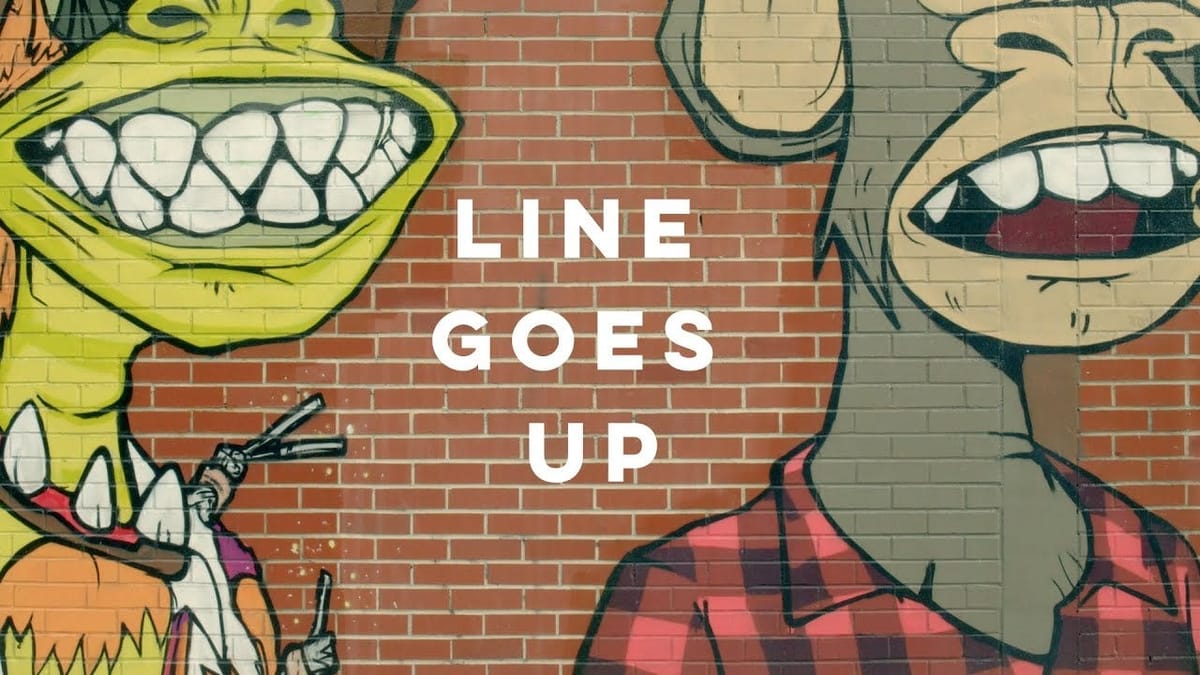Three things web3 should fix in 2022
A viral video highlights some very real shortcomings in the next-generation internet

Last weekend, it felt like everyone I knew was sending me the same link. “The Problem With NFTs,” a long video essay by the Canadian media critic Dan Olson, ricocheted around all corners of the tech world since it was uploaded on Friday. (It now has 2.6 million views and climbing.) Over 138 meticulously researched minutes, Olson traces the history of the 2008 financial crisis, the creation of Bitcoin and Ethereum, and the rise of NFTs and DAOs, and reaches the conclusion that what we have taken to calling “web3” is effectively beyond saving: the technology is too broken, and its creators too indifferent to its failures, for it to ever to live up to the promise of its most starry-eyed backers.
Few of Olson’s criticisms are entirely new, and on my Twitter timeline this week, I saw many crypto enthusiasts dismiss them out of hand. Few people working in the space will be surprised to learn that crypto3 is awash in grifts; that current blockchains are energy inefficient and expensive; or that digital wallets are difficult to use and fraught with danger. Many web3 builders will also bristle at Olson’s tone, which is smug and hectoring in the house style of the YouTube video essayist; his audience is not people working in crypto, but rather everyone he thinks ought to be afraid of those people.
And yet the collective force of Olson’s arguments is substantial. His essay explains the rise of cryptocurrencies through the lens of rising inequality; pandemic-era isolation and loneliness; self-dealing venture capitalists; and a desperate sense among young strivers that the future is only ever getting smaller. All of which feels particularly timely, given this week’s crash in crypto prices.
As a standalone explanation for crypto, I find Olson’s take incomplete. There’s a lot he leaves out, including all the people who have improved their financial situation substantially through crypto investing. Even so, many viewers will find it a necessary corrective to crypto’s multi-year hype cycle, with seems to accelerate daily with each new corporate NFT release, celebrity Bored Ape purchase reveal, and surprise token airdrop.
All of which is to say: you should watch it. (The video is helpfully divided into chapters if, for example, you’re already familiar with the story of Bitcoin; if nothing else you can skip to Olson’s three-minute conclusion.) More to the point for our purposes today, if you’re one who believes fervently in crypto’s future, you also ought to reckon with it.
Because whatever you make of Olson or his overall argument, it’s undeniable that today web3 is a mess — and not just in a “we haven’t finished building it” sort of way. Web3 is a mess of a kind that it could take five or more years to fix, and that assumes the work gets started soon.
And the thing is … I’m just not sure people are working on these things. I read the funding announcements, I talk to the product people, I follow the Twitter timeline. The other day I read a long post where investors talked about “what to watch in crypto in 2022,” and it sounds exactly like what we were supposed to watch in 2021: music NFTs! DAOs trying things! “The infrastructure phase.”
But between Olson’s essay and Moxie Marlinspike’s recent critical explorations of the space, it’s clear that in too many areas progress has been slow to nonexistent. So with that in mind, let’s talk about three things crypto people should actually work on in 2022.
Make crypto transactions safe, reliable, and approachable to normal people.
Here’s a story about the blockchain. The other day some people figured out that some high-priced NFTs listed on the trading platform OpenSea had been listed multiple times, some for a small fraction of what they are worth today. These people took advantage of this fact to buy and then immediately re-sell the NFTs for hundreds of thousands of dollars, without the seller ever realizing what was happening.
On a good marketplace, you would only be able to list a product for sale once, and at the price you intend to sell it for. At OpenSea, though, multiple listings were possible. And blockchain-based transactions are irreversible. So as with so many things in crypto, the losers here could only fall on the mercy of the platform, which did in the end reimburse them. But I was struck by what OpenSea told CoinDesk about the issue:
An OpenSea spokesperson told CoinDesk via email that "this is not an exploit or a bug" but rather "an issue that arises because of the nature of the blockchain."
Try to imagine you had just lost several thousand dollars because it turned out that you had inadvertently listed the same product twice for wildly different prices. And then imagine calling up the marketplace to complain and the person on the other end of the phone saying “good news, this is not an exploit or a bug. This is simply an issue that arises because of the nature of the blockchain.”
I can’t imagine you would do business with that company again. More to the point, I can’t imagine regular people ever doing business with this kind of company at all. In the early dot-com days, I used to think people who refused to give their credit card information to e-commerce sites were being a little paranoid. On web3, paranoia is a requirement to do any sort of business, period.
In his video, Olson memorably says that every “smart contract” is a bug bounty. The OpenSea story is a vivid example of how. But even though “scams” and “crypto” have been inextricably linked in the public conversation for the better part of a decade, it’s remarkable how little progress has been made on that front. Wild new scams pop up constantly; here’s an alert about hackers sending people free tokens that trick them into emptying out their entire wallets.
If the web3 world is likely to tackle any issue here, it’s this one; their businesses depend on them making services that are broadly safe, accessible, and popular. But it’s not enough to way “we know, we know.” If web3 can create comprehensive solutions here, it’s time to prove it, and soon. (OpenSea did, for what it’s worth, update its listings manager this week in an effort to prevent similar non-exploit, non-bug, nature-of-the-blockchain-related issues like this from occurring again.)
Make a moderately efficient blockchain “computer.”
Web3 backers love to talk about how blockchain networks are computers that can be programmed to do anything you imagine, given superpowers by the fact that they are also decentralized. Ethereum was the first of these computers to get real traction, but it was quickly overwhelmed by traffic. Traffic is managed by charging fees to use the computer, and the fees to complete a single transaction on the Ethereum network can run over $100. Imagine spending $75 to create a “free” Facebook account, and another $75 every time you wanted to post something, and you have a sense of what it would be like to participate in a social network on the blockchain today.
Ethereum is in the midst of a transformation designed to make it more efficient — which is to say, faster, less expensive, and less wasteful of energy. In the meantime, technologists routinely appear announcing that they have built a more efficient blockchain. Solana, for example, is a company that raised $314 million last year to build what it calls “the fastest blockchain in the world.”
With that in mind, let’s check in on how the fastest blockchain in the world was doing on Sunday, when the aforementioned crypto crash led many people to use it to buy and sell assets. Here’s Frank Chaparro at The Block:
As the price of cryptocurrencies across the board slid during Friday's trading session, traders large and small found themselves unable to execute transactions on Solana's blockchain — a protocol that has been touted by proponents for its scalability and fast transaction speeds. Transactions per second (tps) were down significantly.
Those issues spilled into Saturday. Meanwhile Solana's official status Twitter account noted that the blockchain has been "experiencing high levels of network congestion" tied to "excessive duplicate transactions."
And so, it seems, Solana is the world’s fastest blockchain until a lot of people want to use it at the same time, at which point it performs just like any other blockchain, which is to say badly.
I don’t know, maybe this is all just a Moore’s Law thing, and in the future our quantum computers will effortlessly validate new entries to blockchain ledgers for small fractions of a cent within seconds. But if web3 wants to be broadly accessible, it can’t be nearly so slow, expensive, and wasteful.
On this front, nobody seems to be particularly close to cracking the code.
Develop technologies for mitigating harassment and abuse.
Keeping people safe on platforms today rests on a handful of assumptions that we take for granted: that our posts, purchases, and other activity is mostly private; that offending materials can be removed; that bad actors can be prevented from evading bans by keeping record of phone numbers, IP addresses, and other signals.
On the blockchain, none of that is true. Transactions are public; transactions are immutable; and regaining access to a platform is as simple as creating a new wallet. In his video, Olson speculates about how corporations or governments could scan blockchain transactions and use them for the purpose of discrimination; it’s one of his points that landed the hardest with me.
In an excellent blog post published a day after Olson’s video, software engineer Molly White elaborates on potential blockchain abuses. She writes in part:
People who keep their cryptocurrency wallet addresses private often do so with good reason: there is very little privacy available once your crypto wallet address is known, because every transaction is publicly visible, and attempts to obscure them often easily unobscured with chain analysis tools. Imagine if, when you Venmo-ed your Tinder date for your half of the meal, they could now see every other transaction you’d ever made—and not just on Venmo, but the ones you made with your credit card, bank transfer, or other apps, and with no option to set the visibility of the transfer to “private”. The split checks with all of your previous Tinder dates? That monthly transfer to your therapist? The debts you’re paying off (or not), the charities to which you’re donating (or not), the amount you’re putting in a retirement account (or not)? The location of that corner store right by your apartment where you so frequently go to grab a pint of ice cream at 10pm?
Not only would this all be visible to that one-off Tinder date, but also to your ex-partners, your estranged family members, your prospective employers. An abusive partner could trivially see you siphoning funds to an account they can’t control as you prepare to leave them. As for the marketing machines and predictive algorithms that currently suck in every scrap of data they can to determine what ads to show you, or evaluate your suitability for a mortgage, or try to predict if you’ll commit a crime? Well, they’ve just hit the jackpot.
On Twitter, I asked who might be working on these issues; so far, I’ve yet to receive any replies. It’s hard to imagine a bigger hurdle to the mass adoption of blockchain technologies than the absence of basic trust and safety features, and yet to date we’ve seen very little.
It seems likely that, to the extent that any of the issues above are solved, it won’t be by decentralized networks of computers, but by centralized platforms that build those costs into their business models. At which point web3 will look like the Web 2.0 do-over that Olson describes it as.
All that said, I keep an open mind about blockchain technologies, if only because of the enormous amount of talent and money that is now working on it. (Also, I find relentless negativity both soul-crushing and tedious.) None of the problems here seem impossible to solve, though I suspect it could be a half-decade or more before the industry starts to get a handle on them.
But the time to start is now. The rapid growth of web3 is bringing increasingly savvy critics like Olson and Marlinspike into the space, and their views cannot be dismissed as sour grapes from haters and luddites. Blockchain technologies can no longer truly be said to be new, and yet answers to many basic questions are still proving to be elusive.
By the end of this year, here’s hoping web3 has a little more to show for itself.
Elsewhere on the blockchain: Like Twitter before it, Reddit is testing verified NFT profile pictures. And these people are using NFTs to harvest your IP address.
Pushback
Some people (including my beloved Tabs!) thought I was too easy on Substack in yesterday’s post about competing approaches to moderating misinformation. (See my ethics disclosure.) Renee DiResta, who has closely studied the rise of anti-vaxx movements, pointed out to me that if you really care about the information environment, it’s not enough to simply let people say whatever they want: you have to provide readers with counter-speech and alternate ideas. Otherwise, you’re just letting people choose their own bespoke realities — which is probably not a choice you should dress up in the language of civic virtue.
Also, she noted, for all Substack’s critiques of social media, the platform launched by recruiting writers (myself included) based on their Twitter engagement.
Elsewhere, the Washington Post estimates the revenue that Substack will generate this year from its top five anti-vaccine writers at $2.5 million.
Platformer Jobs
Today’s featured jobs on the Platformer Jobs board include:
- Director of Product - Trust and Safety, Roblox.
- Project Lead, Global Coalition For Digital Safety, World Economic Forum.
- Director, Product, DuckDuckGo.
Bolded posts here are paid. For more great jobs in tech policy and trust and safety, or to create a listing, visit here. Nonprofits and academic institutions can post for free using the code NONPROFIT.
Governing
⭐ Europe cleared Facebook’s $1 billion purchase of customer-service company Kustomer but added restrictions to the sale. A notable win for Meta as acquisitions get harder to push through. Here’s Natasha Lomas at TechCrunch:
The EU has cleared Meta/Facebook’s acquisition of CRM maker, Kustomer — accepting a set of commitments from the tech giant to allay competition concerns linked to the fact it also owns a suite of popular messaging apps frequently used by small businesses for customer outreach (aka Facebook Messenger, Instagram and WhatsApp).
The Commission said Meta had guaranteed non-discriminatory access without charge to public APIs for the aforementioned messaging channels to competing customer service CRM software providers and new entrants.
Amazon shut down its “Sold by Amazon” program after the Washington state attorney general filed a price fixing lawsuit. As part of the settlement, Amazon will pay $2.25 million. (Lauren Rosenblatt / Seattle Times)
Amazon will face a unionization election in Staten Island. It’s a victory for Chris Smalls, who was fired for organizing there and has continued his work. (Sebastian Herrera / Wall Street Journal)
And: A look at “Amazon Logistics and Business Management Pathway,” a high school class intended to prepare students for a career in logistics that the company began sponsoring in 2019. (Aaron Gordon and Lauren Kaori Gurley / Vice)
Microsoft is making its gaming subscriptions more flexible after the United Kingdom’s Competition and Markets Authority raised concerns. It’s now easier to cancel a subscription. (Tom Warren / The Verge)
At least 18 senators and 77 members of the House of Representatives own stock in one or more Big Tech companies, an analysis found. Add this to the pile of reasons US tech regulation is going nowhere. (Joshua Green / Bloomberg)
Adobe finalized the first version of its standard for digital content provenance, a key effort to reduce the impact of deepfakes. Its partners on the effort include Microsoft, Arm, Intel TruePic and the BBC. (Ina Fried / Axios)
ID.me, an identity verification company that has a controversial partnership with the IRS, acknowledged that it uses mass databases to conduct its searches. The databases are known to be less accurate on non-white skin tones, raising discrimination fears. (Tonya Riley / CyberScoop)
Vladimir Putin backed a proposal to tax and regulate cryptocurrencies in Russia, rather than banning them as its central bank had proposed. But he backed mining restrictions in areas with electricity shortages. (Evgenia Pismennaya / Bloomberg)
The European Union presented its Digital Decade Principles, a unified vision for the future of the internet. More important than it may seem — we need democratic countries coming together to present positive visions for the web. (Clothilde Goujard and Laurens Cerulus / Politico)
Industry
⭐ Facebook’s cryptocurrency project is winding down with a sale of its assets to Silvergate Capital for $200 million. Here are Peter Rudegeair and Liz Hoffman at the Wall Street Journal:
The Diem Association, the consortium Facebook founded in 2019 to build a futuristic payments network, is winding down and selling its technology to a small California bank that serves bitcoin and blockchain companies for about $200 million, a person familiar with the matter said.
The bank, Silvergate Capital Corp., had earlier reached a deal with Diem to issue some of the stablecoins—which are backed by hard dollars and designed to be less volatile than bitcoin and other digital currencies—that were at the heart of the effort.
Apple posted record quarterly sales. The numbers suggest the company more than capably handled its supply chain issues. (Mark Gurman / Bloomberg)
Google Cloud sales people are going after crypto businesses. Strike while the iron is hot. Jordan Novet / CNBC)
The fastest-growing sub-Reddit, Antiwork, went private after a series of brigading attacks. It’s unclear exactly what happened; the moderators aren’t talking. (Lindsey Rupp and Claire Ballentine / Bloomberg)
Fanhouse, a safe-for-work OnlyFans clone, added a 50 percent surcharge to its in-app purchases on iOS to compensate for the Apple tax. Good luck with that. (Mia Sato / The Verge)
Warner Music bought virtual land in the Sandbox to open a virtual concert venue in the metaverse. Extremely punk rock. (Adi Robertson / The Verge)
Those good tweets
Has anyone tried putting all the Wordle answers together to see if they spell out a warning
— Jessie Cannizzaro (@JessCannizzaro) 12:32 AM ∙ Jan 26, 2022
I just met the saddest German I've ever known, Hans down
— Andy Ryan (@ItsAndyRyan) 12:58 PM ∙ Jan 25, 2022
i got rejected from a job and google wants me to reply with, "bummer!"
— mary heisey (@mary_heisey) 6:53 PM ∙ Jan 25, 2022
Talk to me
Send me tips, comments, questions, and your web3 fixes: casey@platformer.news.





